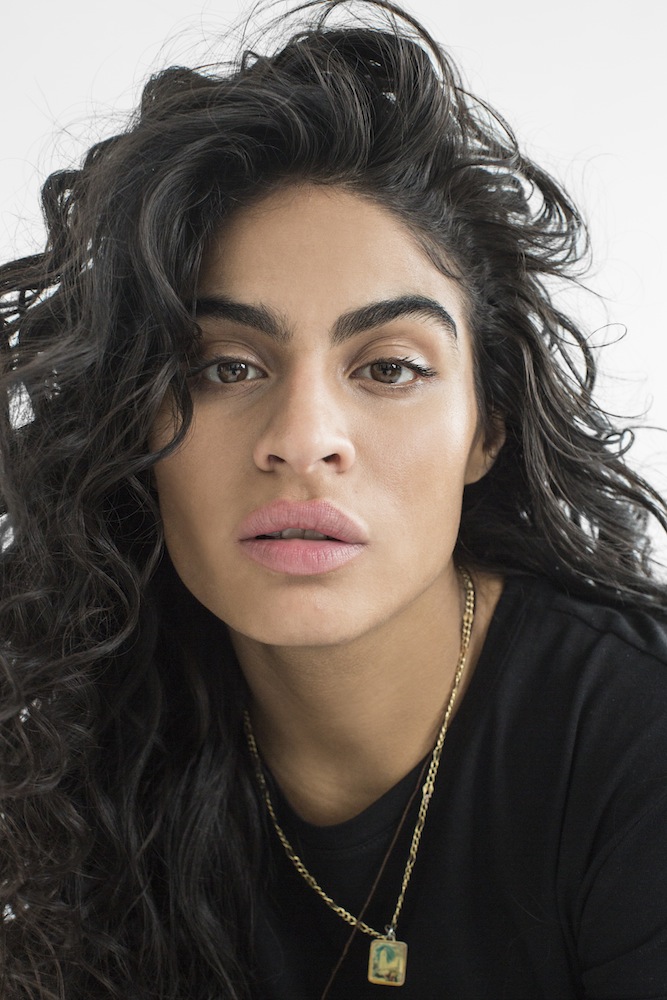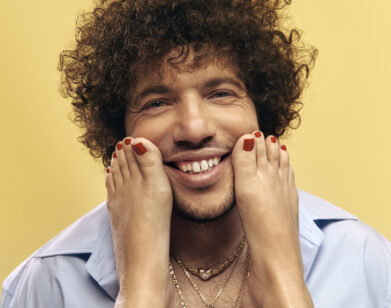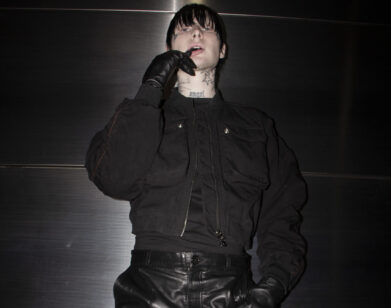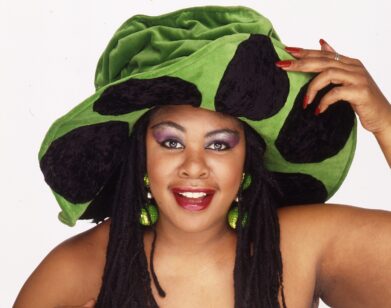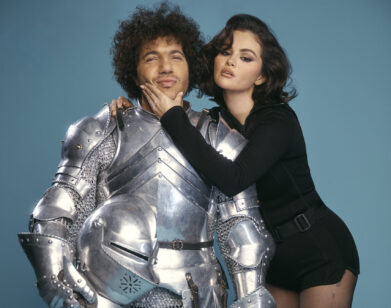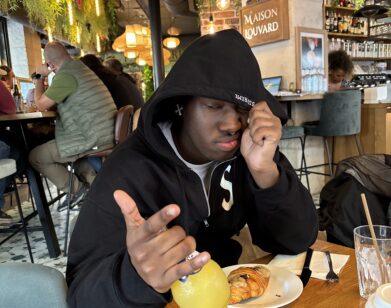Jessie Reyez
JESSIE REYEZ IN NEW YORK, JUNE 2017. PHOTOS: VICTORIA STEVENS. STYLING: LILLI MILLHISER. HAIR: MARTIN-CHRISTOPHER HARPER FOR PLATFORM|NYC USING R+CO. MAKEUP: ANDREW COLVIN USING BOBBI BROWN.
Three years ago, Jessie Reyez was in Sweden at a songwriting workshop, crafting hits to pitch major artists and making her own music on the side. Today, the 26-year-old is headlining her first tour, building off of the April release of her commanding yet vulnerable debut EP Kiddo (FMLY), in which she announced herself as an artist all her own, not just for others.
Music has been a part of Reyez’s life since before she can even remember. “My mom says that she caught me one day in front of the TV watching opera,” the Toronto native recalls. “I was trying to sing back the opera. She saw that I really liked music and so she put me in piano lessons when I was about three years old.” Thanks to her family’s support and a middle school English teacher encouraging her to write poetry (credit to Mrs. Higgins), Reyez wrote and performed often over the years, busking in her hometown and sharing songs on Facebook before moving to Miami with her family and becoming a bartender. Her pursuits as a songwriter and creator began in earnest in 2014, when she returned to Toronto and joined The Remix Project, a collaborative center of art that ultimately connected her to the likes of King Louie and Chance the Rapper.
When Interview spoke to Reyez by phone last week, she was on the road in a van heading westward. Tonight she performs a sold-out show at Hollywood Forever Cemetery’s Masonic Lodge in Los Angeles, and on July 7 she’ll wrap her tour on her home turf in Toronto.
HALEY WEISS: I’d love to hear a little bit about The Remix Project, because I know that was a big part of you starting your career. Can you tell me how you became involved and what you took away from it?
JESSIE REYEZ: I would say that The Remix Project changed my life. To be specific, it’s an art incubator for at-risk youth from the age of 16 to 24, and they have one in Toronto and one in Chicago. If you don’t have the connections or you don’t have the network to get involved in your world—if you’re a photographer, if you’re a videographer, a singer, anything—they take you in. It’s cool because everyone there has the same objective of building up their portfolio and learning, and everyone ends up pushing each other. You can walk out with other people’s networks, too, because everyone connects. Collaboration is very much encouraged. The way I heard of it was because I was on Facebook blasting one of my videos when I was living in Florida, trying to spam everybody I could, and one of the guys that I spammed was Mauricio Ruiz, and he worked with The Remix Project. He was like, “Hey, the music’s dope, I don’t know if you’ve ever heard of this place,” but then he explained it to me. I was bartending at the time so I ended up asking my boss if he could give me a weekend off to come back to Toronto and audition. I bought a 50-dollar flight on Spirit Airlines, played my guitar, told them my story, flew back to Florida, finished a few more bartending shifts, and then I got told that I had made it. Everything kind of snowballed from there. King Louie ended up coming to speak as one of the mentors. Kendrick [Lamar] came a few years ago. They get people who are influential and have wisdom to offer. King Louie came and he liked one of the songs that Gavin Sheppard, the founder of the project, played him and then said, “We should work.” He only had a day, we ended up making it work, and then Chance the Rapper, Chance tweeted lyrics, and we became friends, and at one of his shows I met up with Skrillex, and then everything else is history.
WEISS: What did you learn from working with people like King Louie and Chance? Were there specific takeaways?
REYEZ: Yeah, King Louie said something that really stuck with me. We had different people come in—and everyone comes from a different school of thought, everyone has different opinions—and some people were like, “You need to be very specific with your goals and you need to know exactly where you want to go.” Whereas he said something that I think helps comfort a lot of people that don’t know exactly what their bull’s-eye is yet; they know that they want to achieve something but they’re still trying to find that out. He was like, “Just know that you want to elevate yourself. Know that you want to progress. Know that you want success.” For people that still don’t have that tangible map in their heads, I thought that was super dope. That resonated a lot with me. Also, that hard work pays off, man! You can’t fake the funk. I see Chance and his team and King Louie and his team, and they bust ass. There are no shortcuts. You just got to do it, you’ve got to grind. And you’ve got to be a good person, too. Luckily everyone that I’ve collaborated with, everyone that has been willing to offer guidance and advice, they’ve all been dope people. Maybe don’t be an asshole is the indirect message. [laughs]
WEISS: Would you say it’s a tight-knit music scene in Toronto?
REYEZ: I’d say so, yes—especially now that Toronto’s getting [the attention] that it wasn’t getting maybe a decade ago. There’s definitely an artistic community in Toronto and there’s this new sense of support, I think. I might be biased because I feel like I’ve been getting nothing but love—I know I’ve been blessed with support and people actually fuckin’ with my music—so I think it’s beautiful. Especially with The Remix Project, they have so many people; it’s like the Remix fam.
WEISS: You’ve said that Quentin Tarantino is an influence of yours, right?
REYEZ: Oh, yeah.
WEISS: What is it about Tarantino that you like? What do you take away from his output?
REYEZ: I love the juxtapositions that he plays with when it comes to these gory, gory scenes with some crazy classical music behind it, or when it’s the complete opposite. Or just colors, themes, and storylines—everything about it. It’s so romantic and at the same time so violent. It’s crazy. I purposely try to make my music cinematic. I try to inspire visuals even though I’m only an instrument of sound. It’s just music, so it’s just going through your ears, but if there’s no visual component, if you’re not watching the music video, I like being able to inspire, to be able to give whoever is listening something in their mind so that they start seeing visuals. And make it cinematic, and that kind of romantic, violent juxtaposition that Tarantino does so often.
WEISS: How long of a time period were you working on Kiddo for?
REYEZ: Two years.
WEISS: What was your mindset during that time? Would you say there was one particular mood or subject you were interested in dealing with?
REYEZ: No—I was just living life. It just so happened that I got my heart broken. It just so happened that I was telling someone a story about what happened to me with “Gatekeeper” a couple years ago—I was telling it to William Larsen, the producer—and we ended up coming out with that. There wasn’t this defined, “This is what we’re building, this is what I’m writing.” I knew that I wanted to make a project. I knew that I was working toward that. But during the first year of Kiddo, I didn’t know I was making Kiddo. I was primarily writing for other people, writing for TV, and doing writing camps as opposed to focusing on myself as an artist. It wasn’t until me and my team decided, “It’s now or never. We just have to put all our eggs into you. Let’s just go hard on the artistry without worrying about writing camps and making songs for other people.” And it ended up turning into Kiddo.
WEISS: What was it like making the final tracklist? Did you have a lot to choose from?
REYEZ: We had a fucking plethora of songs. Like I mentioned, because I was writing so much for other people, there were songs that I knew struck my heart, and there were songs that I knew that struck my heart but I had consciously written for others. All of the songs on Kiddo were a part of my soul; they’re songs that I could never give away. We had a lot to choose from, but my managers, they really helped me too because there’s so much that we had to trickle it down.
WEISS: Whose opinion do you trust when it comes to making major decisions other than your own gut instinct?
REYEZ: Honestly, I’m really fortunate that I have a team that understands my mission and understands who I am. My gut, my compass, I trust that a lot. But when you’re in a pool of 200 songs and they’ve all come out of you, and you gravitate towards something but something else hits other people harder… There’s this quote that resonated a lot with me: “It’s content versus context.” You have to be aware of that, because even though something does speak to you, if you’re making, you’re creating, it goes to the world, it goes to something outside of you, so you have to think of the context that you’re going to put your content into. It helps to have someone that’s not in my head, but people that are around me 24/7, to help show the reflection of myself.
WEISS: When writing “Figures,” the big introduction of yourself to the music scene, you were in Sweden working in this weird context. What was that experience like?
REYEZ: It was cool, man. It’s not like I went there thinking I’d write for the project; I went there for a writing camp, and the way a writing camp works is it’s like 10 writers and 10 producers and there are four studios. They’ll split us up, and then it’s a week—we spent a week in Sweden—so the first day you’re in a certain room with certain people, and then the next day they scramble you up and then see what pops out of the room, and the third day scramble you up again and see what song pops out of the room. It’s kind of like musical chairs—pun intended. [laughs] So it was a writing camp for other people who were pitching for Nicki Minaj, pitching for Beyoncé, multiple people. The third day or fourth day I was with Priest and the Beast and it was dope. They liked my writing style; the way I like to work is I like to create four songs or five songs in a session, make them quickly, and then pick out the one that resonates with me most and put a lot of hours into that one, that hit, as opposed to just making one, because by the end of the session I might not love it—I’ve got to make sure that I love it before I go in.
At the end of the week, they were like, “Listen, we really like you and we like what were making. We want to keep you here for an extra week and we can work on anything, we don’t have to work on pitch songs for other people, we can work on your stuff too.” I felt honored and I was like, “Okay, cool, thank you,” and so I ended up staying and we ended up making I don’t know how many songs. One of those songs was “Figures” and it was because I was going through some shit back home in Toronto with my ex. It was almost a blessing for them to have said, “Stay longer,” because the last thing I wanted to do is go home. I don’t know if you’ve been through a breakup where you’re in the same city, it’s so shitty, because it makes you want to not go home; it makes you want to run away from this world that used to be yours, but now because you share memories with someone, it’s this shared world, you can’t even run away from it because home is where they are. The fact that I got to stay already felt like a comfort, and I was able to let that shit out on the song and cry on the song.
WEISS: Why was that song your first release? Why did you choose that one in particular?
REYEZ: Because it seemed like it was the most potent. We played the songs for a few people before we released it, and you can gauge people’s reactions. It seemed like sometimes when we would play that song, time would just stop for some people, and it seemed like it was the right thing to do. It wasn’t the obvious thing to do, we definitely—me and the guys—went back and forth a few times about which one was going to be the first song off the project, but I’m happy that we made that decision.
WEISS: I’d be curious to hear if there are particular qualities you value most in your own music and in other artists. Your music seems very frank to me, very vulnerable. Are those things you would rank high on your list of what you want your music to be?
REYEZ: Yes. I want it to be honest—I think that’s the really big thing. I want it to be good. [laughs] I want it to sound good, but I want it to be honest. I want it to not be anything synthetic or anything forced. I want it to be human.
KIDDO (FMLY) IS OUT NOW. FOR MORE ON JESSIE REYEZ AND HER UPCOMING TOUR DATES, VISIT HER FACEBOOK.

